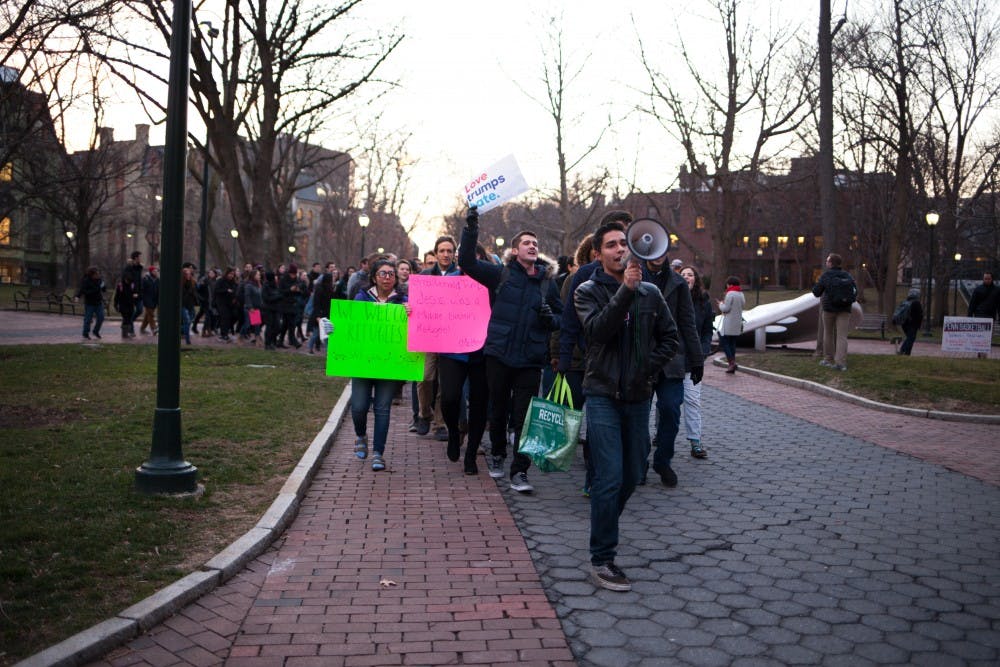
Potential changes to the H-1B visa program under President Donald Trump's administration is prompting international students at Penn to reconsider their long-term plans in the United States.
The H-1B visa program allows foreign nationals with highly specialized knowledge to work in the U.S. for up to six years. News agencies from CNNto Bloomberg have reported that the program may be the Trump administration’s next target for immigration reform — a cause for concern since many international students at Penn use this visa to work in the U.S. after graduation. This news follows Trump's immigration ban announced on Jan. 27, which temporarily bars nationals from seven Muslim-majority nations from entering the country.
In January alone, three bills have been proposed in Congress to curb the H-1B visa program. Potential changes include increasing the minimum salaries of H-1B visa holders from $60,00 to $130,000 and changing the visa lottery system to a “preference system” that would give priority to students educated in the U.S.
“A lot of international students come to Penn with the intention of getting a job here, so if that isn’t on the table anymore, it is a big change,” Former President of the Assembly of International Students and College and Wharton seniorAnny Hu said. She added that changes to job prospects may deter international students from even applying to Penn.
In an email statement, Director of Career Services Patricia Rose said that while "students are concerned about how the new administration’s policies will affect their post-graduation employment prospects,” it is too soon to tell what changes will actually be implemented.
“Rumors suggest outsourcing firms may be affected, but very few Penn graduates go to work for such firms. For now, we encourage students to consult with our career advisors on employment concerns, and with ISSS on visa matters,” Rose said.
2016 College and Wharton graduate David Britto works at an economic consulting firm and is applying for the H-1B visa this April. A citizen of the United Kingdom, he said that he is not “personally anxious” about changes to the visa program because like many other international students, he had already been planning for alternatives before Trump. himself a 1968 Wharton graduate, took office.
Even without further restrictions, the H-1B visa program is highly competitive. In 2016, less than 30 percent of the 236,000 applicants received a visa. In the case that Britto’s visa application does not go through, he is considering asking to be transferred to his company’s London office.
Not all students, however, have this option.
“There are certain jobs, and in the case of scientific fields, certain technologies that you just do not find anywhere except the U.S.,” President of the Graduate and Professional Student Assembly and physics graduate student Gaurav Shukla said. "Changes to the H-1B visa program may prevent some graduate and professional students from working in the specific fields that they have spent many years and a large sum of money working towards," he said.
Hu said there are also worries as to how companies will respond to restrictions on the visa program.
“Going through recruiting prior to the immigration reforms was already very stressful because you have to find a company that sponsors your H-1B visa,” she said.
“With the reforms, taking in international students will be even riskier for companies and that is just going to add more stress on top of everything that we already have to deal with,” Hu added.
Both Britto and Hu agree that there are unlikely to be major changes before the next H-1B visa lottery in April, though the uncertainty surrounding Trump's immigration reforms is enough to cause anxiety.
“The pace at which the administration has been going makes it impossible to say what is going to happen,” Britto said.
While most graduating seniors already have contingency plans in place, Hu said the future remains uncertain for international freshmen and sophomores on campus.
“Penn is already super stressful,” she said. “And my concern is that this is going to make it worse. This is your work, your personal life — a lot of things will be affected.”
The Daily Pennsylvanian is an independent, student-run newspaper. Please consider making a donation to support the coverage that shapes the University. Your generosity ensures a future of strong journalism at Penn.
Donate







